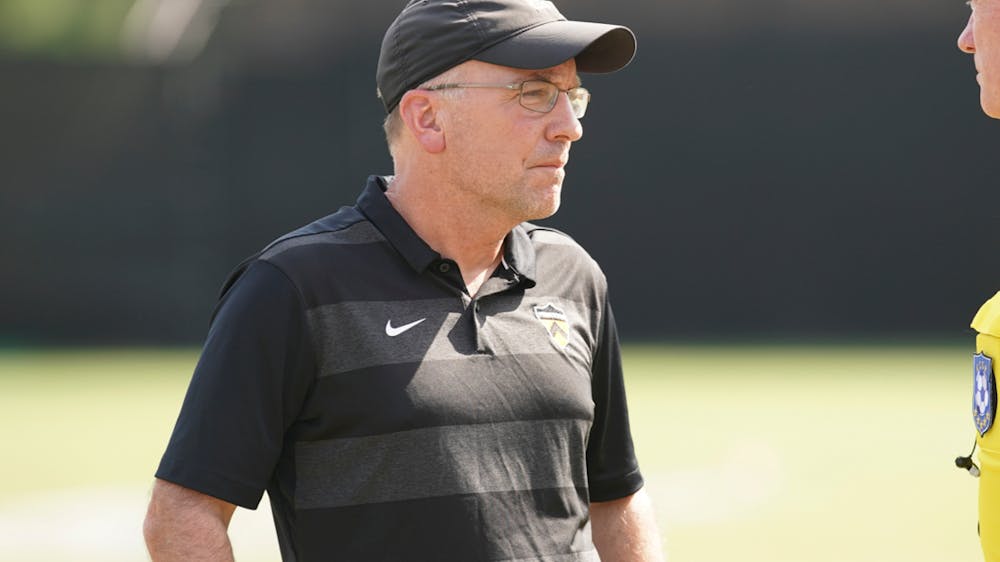When the Ivy League announced that fall athletic competition was canceled, any plans coaches had made for in-person activities vanished. Teams such as men’s soccer, however, have adapted to their time off-campus, even as uncertainty shrouds their spring season.
“We’re just trying to focus on the things we can control,” said head coach Jim Barlow, in his 24th year at the Princeton men’s soccer program.
Though some schools have held in-person practices, Barlow said he “trust[s] that the University made the best decision … for the health of the community” when it decided not to welcome the vast majority of undergraduates back to campus this fall. “We are still in a holding pattern with regard to our spring plans,” he added, pending next month’s announcement.
Although the team has not conducted in-person practice since March, the players and coaches have done their best to remain in close contact. Though much of their Zoom meeting time has been dedicated to “chalk talk” and film in the spring, the team branched out over the summer to cover a wide variety of topics, including racial justice and leadership.
The team also welcomed two Princeton Soccer alumni who produced Soccertown, USA, a documentary that tells the stories of Tab Ramos, Tony Meola, and John Harkes, all of whom grew up together in Kearny, NJ and went on to be star players for the U.S. Men’s National Team. The team also heard from Jesse Marsch ’96, coach of Red Bull Salzburg, and Charlie Stillitano ’81, chair of Relevent Sports.
National Collegiate Athletic Association (NCAA) regulations, enacted due to the large number of athletes taking leaves of absence, have prevented the team from engaging in team-wide discussions about tactics on the practice field. NCAA code stipulates that players not currently enrolled cannot attend team meetings in which soccer tactics are discussed, though the rest of the team is permitted to discuss tactics.
Barlow said that around 40 percent of his squad elected to take a gap year.
“It was really on a case-by-case basis with each player, trying to decide what made the most sense for [each player], and what he was planning on doing … with the year,” Barlow said. He also noted that some players’ plans became clearer once the University announced in August that students approved only for two-year leaves could reject the offer.

While coaches cannot communicate tactics to players on leave, they are able to discuss workouts and other objectives to help the players keep on track. Barlow added that the NCAA recently announced a forthcoming exception, which will allow gap year students to be part of sport-related discussions.
Some team members are living and training together, and many have competed with club teams thanks to NCAA exceptions made this year for gap-year athletes.
Players taking a year of absence have also been able to fill time with meaningful work in the community; one player volunteered as a poll worker, others have been involved with initiatives in the University’s Office of Equity and Inclusion, and the team worked together with Princeton Women’s Soccer to raise money for homeless youth.
“We’ve had some guys involved in service activities, and that has been good,” Barlow said.

Beyond complicating the logistics of team meetings, the number of players taking a year off has also presented recruiting challenges. The team is looking to bring in a smaller recruiting class next year in order to maintain a steady number on the roster.
“We usually hope to bring in six or seven new players every year ... this year we are hoping for only around four,” Barlow said. “From a long-term standpoint … it is helpful that [leaves] weren’t clustered in one or two classes.”
Recruiting challenges also surfaced after the NCAA extended the recruiting “dead period” to January, making it more difficult for the staff to get a nuanced look at their recruiting targets. Even while many clubs and schools are holding competitions across the country, the dead period prevents them from either watching or meeting with recruits in person. Instead of in-person recruiting, Barlow’s staff has no choice but to watch a massive amount of film.
“We’re getting inundated with tons and tons of film [from prospects] to go through,” he said
Despite obvious complications, Barlow remains positive about the recruiting process.
“We’re still optimistic that really good student-athletes are going to be interested in Princeton,” he said. “Our biggest selling point is our incredible campus and facilities … it’s awesome to be able to have our recruits interact with [professors and staff],” albeit in a virtual setting.
Barlow acknowledged that the being remote and not knowing how the spring will unfold have been frustrating. “The thing that has been removed is the most fun part,” he lamented, in reference to practices and games. Barlow has watched quite a bit of soccer, taken long walks, and listened to a variety of podcasts since March, but nothing quite matches the excitement of being on the pitch.
Yet, he remains excited for the future.
“I look forward to pushing training sessions … and figuring out who will take care of what responsibilities,“ he said. “There’s nothing as fun … as when your team starts to become a team.”








